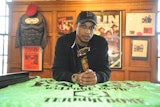TUSKEGEE, Ala. — In 1941, Eleanor Roosevelt made history when she flew into this small rural town with a Black Army pilot to show support for the Tuskegee Airmen. It was during that visit that the former first lady, who was progressive on race relations, visited the sprawling campus of the private, historically Black college that Booker T. Washington helped to start back in 1881.
On Saturday, Michelle Obama became the second first lady to visit Tuskegee University and, like Roosevelt, she used the opportunity to train a national spotlight on the issue of race.
 Dr. Brian L. Johnson, president of Tuskegee University (left), presents First Lady Michelle Obama with an honorary degree. (Photo courtesy of Tuskegee University)
Dr. Brian L. Johnson, president of Tuskegee University (left), presents First Lady Michelle Obama with an honorary degree. (Photo courtesy of Tuskegee University)In her rousing commencement speech, Obama talked about the personal challenges that she’s faced and the racial discrimination she’s felt since her husband first took office in 2009.
For the Obamas ― who have been particularly cautious about talking publicly about their own Blackness — the first lady’s detailed account of her experiences as a Black woman was greeted with thunderous applause and pride by the nearly 5,000 spectators who gathered inside of the university’s General Daniel “Chappie” James Center for Aerospace Science and Health Education, which was named after the first Black American to achieve the rank of four-star general in the United States military.
“Over the years, folks have used plenty of interesting words to describe me. One said I exhibited ‘a little bit of uppity-ism.’ Another noted that I was one of my husband’s ‘cronies of color.’ Cable news once charmingly referred to me as ‘Obama’s Baby Mama,’” she said. “All of this used to really get to me. Back in those days, I had a lot of sleepless nights, worrying about what people thought of me, wondering if I might be hurting my husband’s chances of winning his election, fearing how my girls would feel if they found out what some people were saying about their mom.”
She said that a July 2008 cover of The New Yorker, which featured a satirical illustration of her dressed as a Black Panther, deeply saddened her.
“As potentially the first African-American first lady, I was also the focus of another set of questions and speculations; conversations sometimes rooted in the fears and misperceptions of others,” she said. “Was I too loud, or too angry, or too emasculating? Or was I too soft, too much of a mom, not enough of a career woman?”
Over time, she said that she worried less about what others said about her.
“I realized that if I wanted to keep my sanity and not let others define me, there was only one thing I could do, and that was to have faith in God’s plan for me,” she said. “I had to ignore all of the noise and be true to myself ― and the rest would work itself out.”
She said that, despite the spate of recent police shootings of young unarmed African-American men, these incidents are “not an excuse to lose hope,” she said. “To succumb to feelings of despair and anger only means that in the end, we lose.”
Although Obama was given an honorary degree at Saturday’s commencement, sources at the university have said that it was the White House who contacted them about the possibility of bringing Obama to campus.
Perhaps it’s a testament of the leadership of Dr. Brian L. Johnson, who was selected last year to lead the storied institution and who has been capturing local and national headlines for his innovative ideas.
“After today, all of you will take your spot in the long line of men and women who have come here and distinguished themselves and this university,” Obama told the 500 graduates. “You will follow alums like many of your parents, grandparents, aunts and uncles, leaders like Robert Robinson Taylor [first accredited African American architect] … You will follow heroes like Dr. [Amelia] Boynton Robinson, who survived the billy clubs and teargas on Bloody Sunday in Selma.
“The story of Tuskegee is full of stories like theirs. Men and women who came to this city seized their own futures and wound up shaping the arc of history for African-Americans and all Americans,” she added.
Valarie Jarrett, a senior adviser to President Obama who traveled on Saturday to Tuskegee with the first lady, noted that Taylor — her great-grandfather — designed many of the buildings on campus.
Jamal Eric Watson can be reached at jwatson1@diverseeducation.com. You can follow him on Twitter @jamalericwatson.















